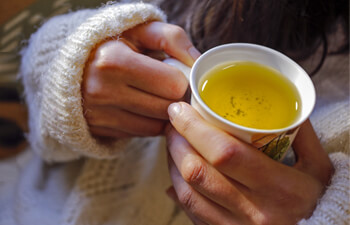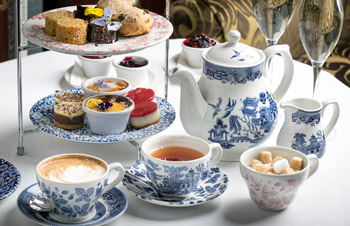Organic English Breakfast Black Tea

This Fair Trade Certified organic tea blend makes the perfect breakfast tea, with a nice medium-body and a full organic black tea flavor that is not overpowering. Particularly enticing with milk, this English Breakfast consists of a blend of high and low grown organic Indian tea, giving it a cup that is brisk and slightly coppery with a somewhat lemony quality.
Ingredients: organic and Fair Trade Certified Indian black tea
What are Blended Teas?

Our delicious blended teas use the same top-quality organic teas and/or botanicals offered in our single origin varieties, but are comprised of teas, herbs, fruit, and/or flowers of multiple origins and/or varieties. When blending our teas, our goal is to create a cup with a specific flavor profile in mind. Unlike single origin teas, which can vary from harvest to harvest (just like wine!), blended teas trade seasonal variation for year-to-year consistency. As a result, the formula and/or appearance of our blends may change over time, but you can rest assured that you’ll always receive an organic cup of tea with consistent flavor.
Steeping Instructions

At Arbor Teas, we believe tea should be brewed to suit your personal taste. We’re happy to make recommendations to get you started, but don’t hesitate to experiment! When brewing your tea, your main considerations are tea quantity, water temperature, and steeping time. We recommend black teas to be steeped for 3 to 5 minutes in water heated to a full, rolling boil. For the best flavor, use fresh water whenever possible, and avoid overboiling. Try not to steep your tea longer than necessary, as you’ll extract undesirable bitterness from the leaves. If you want a stronger brew, don’t steep longer, just use more tea. And don’t forget to re-steep your tea leaves to get the most out of your leaf!
Looking for more info? Check out our How-To Guides and Eco-Brewing Tips!
Staff Perspectives
 Trish
Trish
"I love keeping this classic on hand for guests at home. A crowd pleaser!"
 Aubrey
Aubrey
"This blend stands up to my memories of falling in love with English Breakfast tea while travelling through the UK as a teenager."
Health Benefits

Like all true tea, black tea offers many potential health benefits. Research has found that tea (Camellia sinensis) can have many positive effects on human health, including improved cardiovascular function, cancer risk reduction, improved immune function, improved oral health, and help with weight management. Tea is also full of polyphenols, which are a class of antioxidant that help your body maintain homeostasis and balance your stress levels. Black tea specifically has been found to regulate blood sugar in diabetics better than other types of tea, according to a study done by the University of Massachusetts Amherst.
For more information about the health benefits of black tea and other types of tea, and for direct sources of the above information, check out our Tea Health Benefits page!
Please note: the information above is for educational purposes only and has not been evaluated by the Food and Drug Administration. This information is not intended to diagnose, treat, cure, or prevent any disease.
British Afternoon Tea

Anna, the 7th Duchess of Bedford, is credited with the origination of afternoon tea in the early 1800s. In Anna's day, lunch was served at noon, with dinner often put off until well into the evening. As the story goes, Anna decided that a light meal over tea in the late afternoon would be the perfect solution to her between-meal hunger. Given Anna's social stature, the concept took off among the upper class, proving to be an excellent social venue. The term "high tea" is actually owed to England's working class, who transformed the afternoon tea into their primary evening meal, serving much heartier fare such as meats, cakes, bread and pies. High tea is a reference to the table the working class sat at while taking their tea - tall in comparison to the low, delicate tables at which the gentry took their lighter, more formal tea. Queen Victoria introduced the English to the Russian custom of adding lemon to their tea after visiting one of her daughters in Russia - before that, the English took only milk with their tea.
For even more information about this and other traditions, visit our Tea Traditions page!









